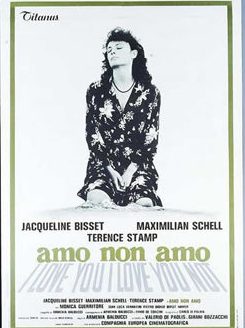Jacqueline Bisset, “the most beautiful woman in the world”, in a passionate drama from a female perspective.
We won’t be compromising ourselves by agreeing with Newsweek, which in 1977 called Jacqueline Bisset the most beautiful woman of all time. Although this film, Armenia Balducci’s directorial debut, has no intention of hiding that appeal, its main intent is another one: the exploration of the dynamics that cause intellectual bourgeois couples to implode at the end of the Seventies, as seen from a female perspective. The undertaking is entrusted to a cast that is not limited to Bisset when it comes to beauty: it also features a young Monica Guerritore and the ex-Miss Germany Birgit Hamer (who becomes headline news when her brother is killed by Vittorio Emanuele di Savoia). Master cinematographer Carlo di Palma’s photography insures the perfect elegant tone and excels in its melancholic rendering of the seaside town of Fregene out-of-season. The music by Goblin, better known for their collaborations on the horrors of Dario Argento, here demonstrates their ability in dealing with more a romantic setting.
She is a designer of a certain renown, separated with a son. He is an intellectual, angry with the world. Their relationship is starting to show some cracks, and their autumnal stay in Fregene only ends up exacerbating their disagreements and fuelling mutual betrayals.
Jacqueline Bisset, “the most beautiful woman in the world”, in a passionate drama from a female perspective.
We won’t be compromising ourselves by agreeing with Newsweek, which in 1977 called Jacqueline Bisset the most beautiful woman of all time. Although this film, Armenia Balducci’s directorial debut, has no intention of hiding that appeal, its main intent is another one: the exploration of the dynamics that cause intellectual bourgeois couples to implode at the end of the Seventies, as seen from a female perspective. The undertaking is entrusted to a cast that is not limited to Bisset when it comes to beauty: it also features a young Monica Guerritore and the ex-Miss Germany Birgit Hamer (who becomes headline news when her brother is killed by Vittorio Emanuele di Savoia). Master cinematographer Carlo di Palma’s photography insures the perfect elegant tone and excels in its melancholic rendering of the seaside town of Fregene out-of-season. The music by Goblin, better known for their collaborations on the horrors of Dario Argento, here demonstrates their ability in dealing with more a romantic setting.
She is a designer of a certain renown, separated with a son. He is an intellectual, angry with the world. Their relationship is starting to show some cracks, and their autumnal stay in Fregene only ends up exacerbating their disagreements and fuelling mutual betrayals.
